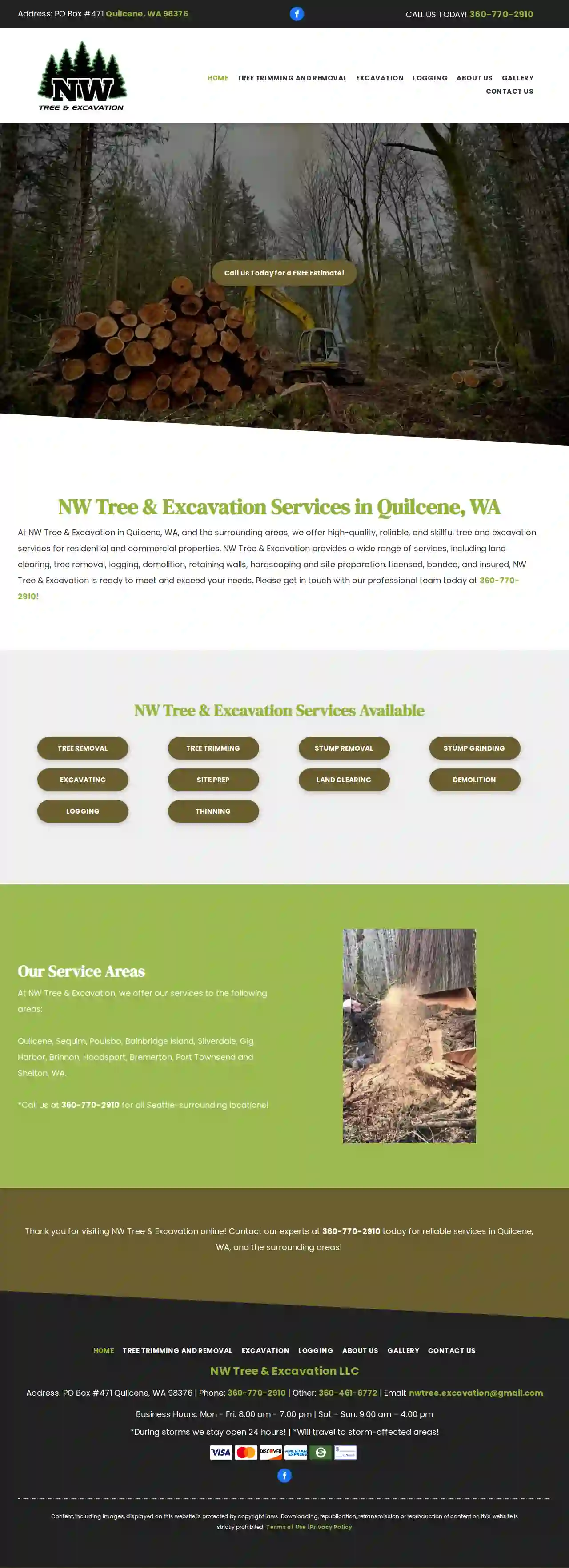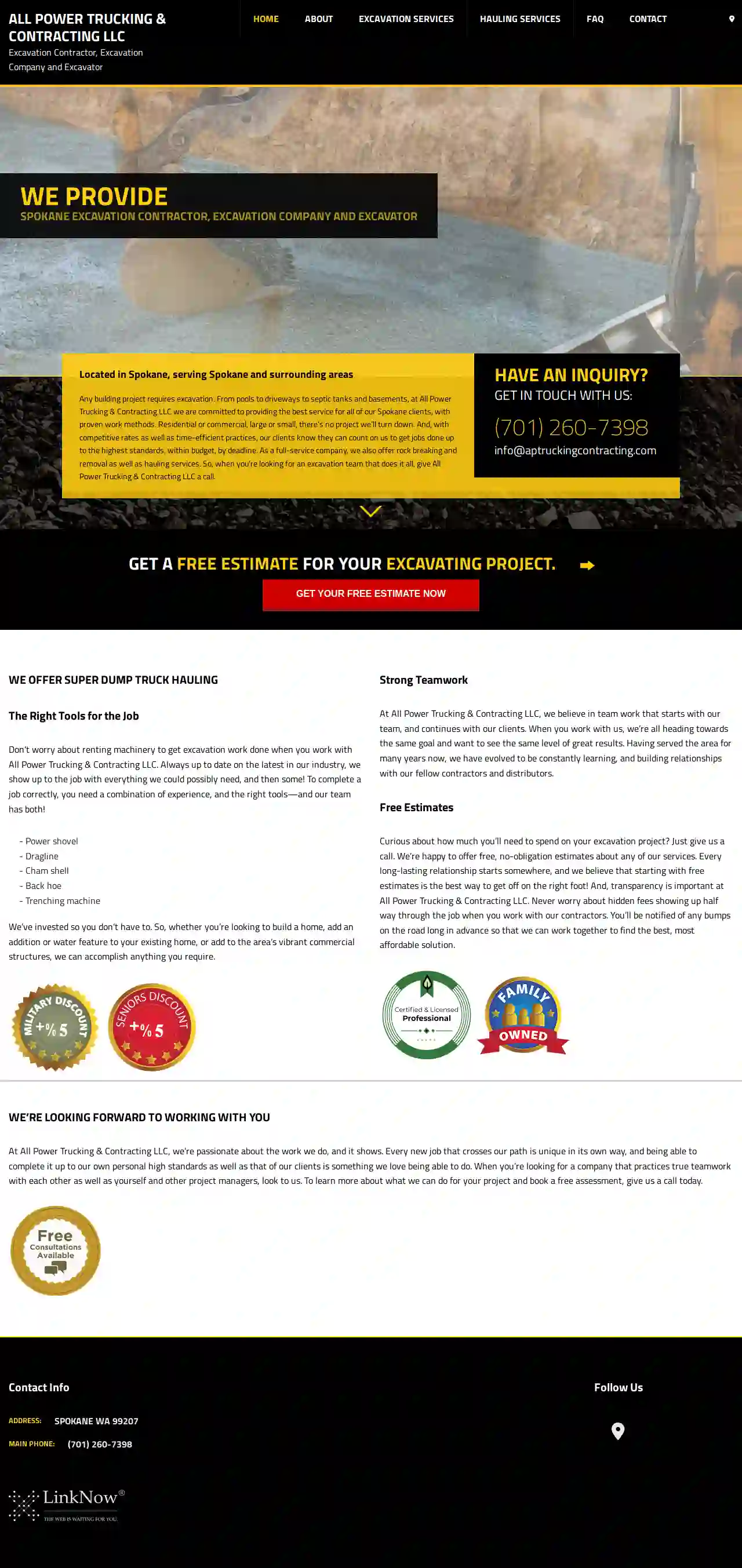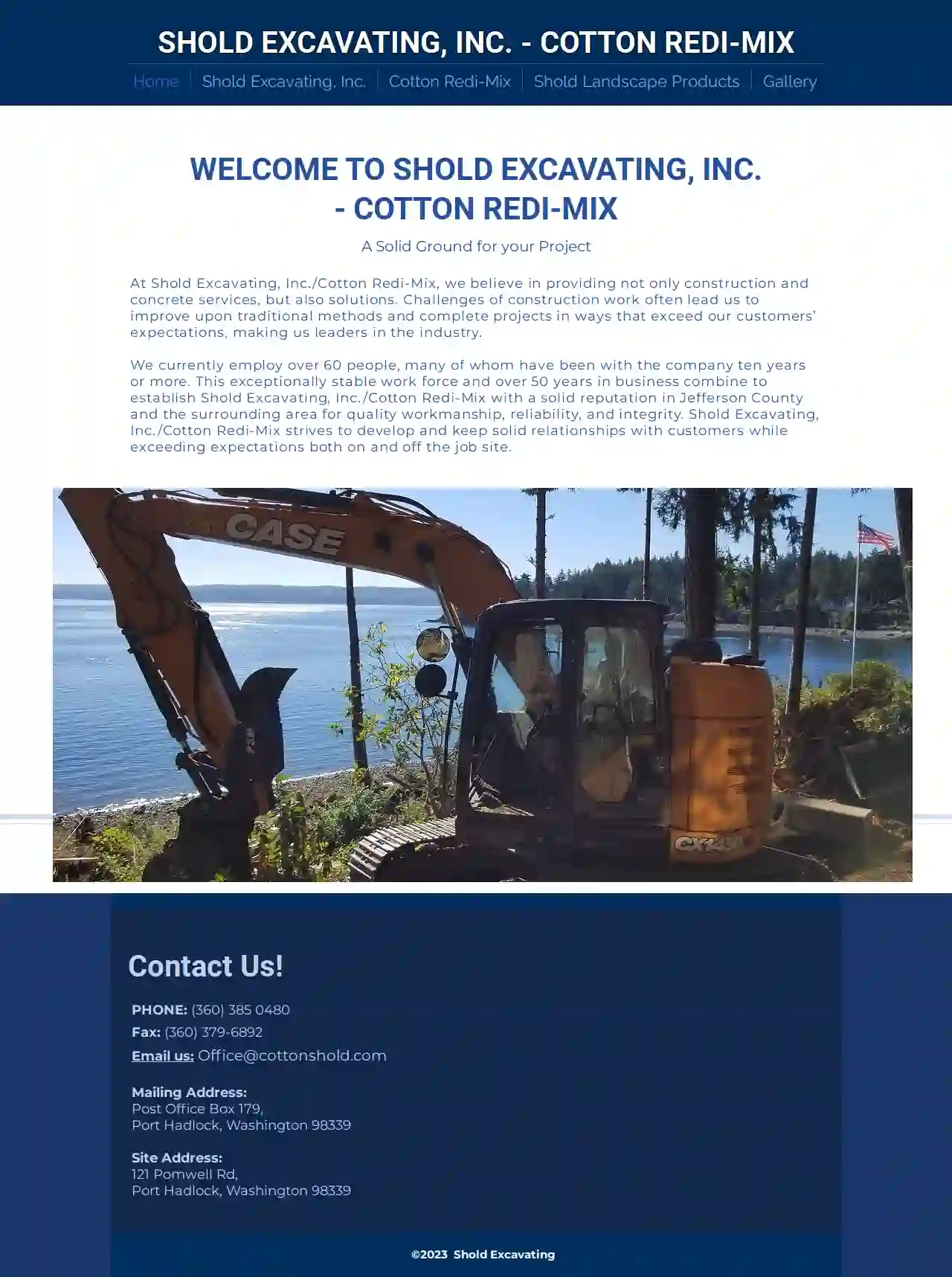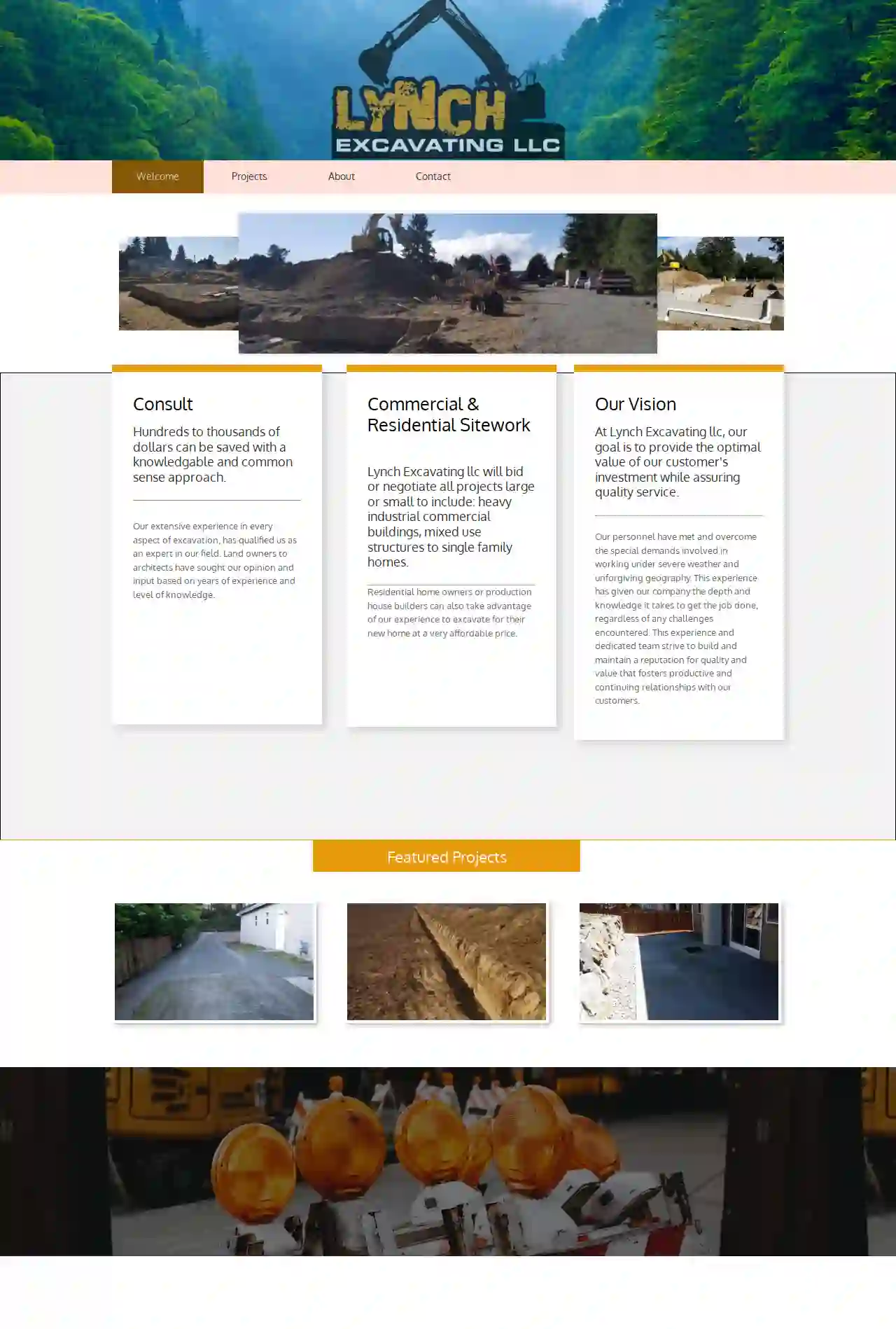Demolition Contractors Poulsbo
Best Demolition Companies in Poulsbo
Receive 3 FREE Demolition Services quotes for your project today! Compare profiles, reviews, accreditations, portfolio, etc... and choose the best deal.

Shaw Island Excavation LLC
52 reviewsShaw Island WA, Shaw Island, 98286, USShaw Island Excavation LLC: Your Trusted Excavation Partner Shaw Island Excavation LLC is a leading excavation contractor serving Shaw Island, Orcas Island, Lopez Island, and surrounding areas. We specialize in a wide range of excavation services, including site preparation, demolition, pond digging, rock removal, septic tank installation, and more. Our team of experienced professionals is dedicated to providing high-quality workmanship, exceptional customer service, and competitive pricing. We understand that every excavation project is unique, and we take a personalized approach to ensure that your needs are met. We work closely with our clients to develop a plan that meets their specific requirements and budget. Our commitment to safety and environmental responsibility is unwavering, and we strive to minimize disruption to your property during the excavation process. Whether you're a homeowner, builder, or developer, Shaw Island Excavation LLC is your trusted partner for all your excavation needs. Contact us today for a free consultation and let us help you bring your project to life.
- Services
- Why Us?
- Gallery
Get Quote
Level Earthworks LLC
52 reviews1202 Black Lake blvd ste c, Olympia, 98502, USLevel Earthworks LLC Level Earthworks is ready to help you make your dream property come to life. We offer a wide range of services, from site development and land clearing to demolition and snow removal. We are committed to providing our clients with the highest quality workmanship at an affordable price. We are also committed to safety and will always work to ensure that your project is completed safely and efficiently. We are a locally owned and operated business with over 15 years of experience in the industry. We are fully licensed and insured and have a proven track record of success. We are dedicated to providing our clients with the best possible service and will always go the extra mile to ensure that you are satisfied with our work. We offer free estimates and are available to answer any questions you may have. Call us today to schedule your free estimate and let us help you make your dream property a reality. We are committed to providing our clients with the highest quality workmanship at an affordable price. We are also committed to safety and will always work to ensure that your project is completed safely and efficiently. We are a locally owned and operated business with over 15 years of experience in the industry. We are fully licensed and insured and have a proven track record of success. We are dedicated to providing our clients with the best possible service and will always go the extra mile to ensure that you are satisfied with our work. We offer free estimates and are available to answer any questions you may have. Call us today to schedule your free estimate and let us help you make your dream property a reality.
- Services
- Why Us?
- Gallery
Get Quote
NW Tree & Excavation LLC
513 reviewsPO Box #471, Quilcene, 98376, USNW Tree & Excavation: Your Trusted Partner for Tree and Excavation Services in Quilcene, WA At NW Tree & Excavation in Quilcene, WA, and the surrounding areas, we offer high-quality, reliable, and skillful tree and excavation services for residential and commercial properties. We are committed to providing exceptional service and exceeding your expectations. Our team of experienced professionals is dedicated to delivering safe and efficient solutions for all your tree and excavation needs. Whether you require tree removal, land clearing, stump grinding, or site preparation, we have the expertise and equipment to handle any project, big or small. We understand the importance of preserving the natural beauty of your property. That's why we use environmentally friendly practices and strive to minimize disruption during our operations. Contact us today for a free estimate and let us help you transform your property into the outdoor oasis you've always dreamed of.
- Services
- Why Us?
- Gallery
Get Quote
All Power Trucking & Contracting LLC
Spokane, 99207, USAll Power Trucking & Contracting LLC: Your Trusted Excavation Partner in Spokane At All Power Trucking & Contracting LLC, we are your one-stop shop for all your excavation needs in Spokane, WA, and surrounding areas. Whether you're a homeowner looking to build a dream pool or a commercial developer undertaking a large-scale project, we have the expertise, equipment, and commitment to deliver exceptional results. Why Choose All Power Trucking & Contracting LLC? Experienced and Reliable: We have a proven track record of delivering high-quality excavation services, earning the trust of countless satisfied clients. Full-Service Solutions: From excavation and demolition to hauling and rock breaking, we offer a comprehensive range of services to meet all your project requirements. Commitment to Excellence: We are dedicated to providing exceptional customer service, meticulous workmanship, and timely project completion. Competitive Rates: We offer competitive pricing without compromising on quality, ensuring you get the best value for your investment. Modern Equipment: We invest in the latest excavation equipment to ensure efficiency, precision, and safety on every job. Strong Teamwork: We believe in collaborative partnerships with our clients, working together to achieve shared goals and deliver outstanding results. Our Services Excavation Services Paving Services Demolition Driveway Excavation Pond Digging and Filling Garden Excavation Pool Digging Pool Filling In Cisterns Septic Tanks Sewers / Underground Utilities Basement Walkouts Rock Breaking and Removal Hauling Services Get a Free Estimate Today Don't hesitate to contact us for a free, no-obligation estimate on your excavation project. We're here to answer your questions and provide expert advice to help you make informed decisions.
- Services
- Why Us?
- Gallery
Get Quote
Valleyworks Excavation LLC
512 reviewsSpokane, USVALLEYWORKS Excavation is a locally owned and operated business dedicated to providing high-quality excavation services for both residential and commercial projects in the Spokane to Coeur d'Alene area. We are committed to building projects that we can all be proud of, and we go the extra mile to ensure that every job is done right. Our team is experienced and knowledgeable in all aspects of excavation, from site preparation and grading to foundation digging and utility installation. We are also equipped with the latest technology and equipment to ensure that your project is completed on time and within budget. At VALLEYWORKS, safety is our top priority. We operate in a manner that ensures everyone goes home safe at the end of the day. We believe that accidents are preventable, and we are committed to providing a safe and healthy work environment for our employees and clients. We are proud to serve the Spokane and Coeur d'Alene communities, and we are committed to providing our clients with the highest level of service and quality. Contact us today for a free estimate or project consultation.
- Services
- Why Us?
- Our Team
- Gallery
Get Quote
Shold Excavating Cotton Redi-Mix
4.39 reviewsPost Office Box 179, Port Hadlock, 98339, USWELCOME TO SHOLD EXCAVATING, INC. - COTTON REDI-MIX A Solid Ground for your Project At Shold Excavating, Inc./Cotton Redi-Mix, we believe in providing not only construction and concrete services, but also solutions. Challenges of construction work often lead us to improve upon traditional methods and complete projects in ways that exceed our customers’ expectations, making us leaders in the industry. We currently employ over 60 people, many of whom have been with the company ten years or more. This exceptionally stable work force and over 50 years in business combine to establish Shold Excavating, Inc./Cotton Redi-Mix with a solid reputation in Jefferson County and the surrounding area for quality workmanship, reliability, and integrity. Shold Excavating, Inc./Cotton Redi-Mix strives to develop and keep solid relationships with customers while exceeding expectations both on and off the job site.
- Services
- Why Us?
- Gallery
Get Quote
Alex's Landscaping & Excavating
53 reviews5499 NE Laura Loop, Poulsbo, 98370, USOur Mission Our mission at Alex’s Landscaping & Excavating is to provide high quality landscape design and care through unparalleled quality, responsible service, and timely solutions at great prices. Our Vision Our vision at Alex’s Landscaping & Excavating is to become the most-sought after landscaping service providers in the entire area by offering responsible garden maintenance and friendly services at competitive prices. Why Choose Us? Choosing Alex’s Landscaping & Excavating is the equivalent of choosing exceptional landscaping design, care, and maintenance at prices that fit your budget.
- Services
- Why Us?
- Gallery
Get Quote
Creekside Excavation
57 reviewsSpokane, USAbout Creekside Excavation Creekside Excavation, a family-owned business founded by seasoned pros Mitchell Snyder and Colby Mead, combines over 15 years of local expertise in both residential and commercial excavation. Based in Spokane, WA, our commitment to exceptional customer service includes prompt responsiveness and same-day bids. Our extensive construction background drives our proficiency in excavation, septic systems, site prep, and custom projects. Trust us for transparent, consistent quotes that empower you to plan confidently and bring your projects to life. Why Creekside? Exceptional customer service is our commitment, ensuring your needs are our top priority with a dedicated and attentive team. Quality Customer Service Our expert excavation services offer precision and efficiency, ensuring seamless groundwork for construction projects of any scale. Expert Excavation Count on us for reliable solutions, delivering consistent and effective results for all your needs. Call us now to schedule your excavation services and take the first step towards a seamless and efficient construction or project experience.
- Services
- Why Us?
- Our Team
- Testimonials
- Gallery
Get Quote
Lynch Excavating LLC
100 County Route 106, Schodack, 12180, USAbout Lynch Excavating Lynch Excavating is a family-owned and operated business with over 20 years of experience in the excavating industry. We are committed to providing our clients with high-quality services at competitive prices. We specialize in a wide range of excavating services, including: Site preparation Grading Demolition Utility installation Drainage And more! We are fully licensed and insured, and we have a team of experienced and qualified professionals who are dedicated to providing our clients with the best possible service. We are committed to safety and environmental responsibility, and we always strive to exceed our clients' expectations. Contact us today for a free estimate!
- Services
- Why Us?
Get Quote
Avey Construction Group
51 reviews5 Mile Prairie, Spokane, USBuilding Beyond Expectations At Avey Construction Group, our driving force is the relentless pursuit of excellence in every project we undertake. Founded in Spokane, Washington, out of a need to fill the gaps in the construction industry, we've evolved into a dynamic team committed to delivering top-notch services. Owned and operated by partners Justin Avey, Eric Morman and Chris Gruben, our teams unique and diverse expertise provides our clients with an unparalleled product and experience that is lacking in the construction scene. Since our inception, we've collaborated with skilled professionals and forged partnerships that have propelled us forward. From renovation and remodeling to concrete work and ADU construction, our diverse portfolio reflects our dedication to versatility and innovation. Each project is approached with enthusiasm and a commitment to exceeding expectations. We're more than just builders; we're partners invested in our clients' success. At Avey Construction Group, we're proud to be your trusted construction partner, driving excellence in every endeavor.
- Services
- Why Us?
- Our Team
- Gallery
Get Quote
Over 22,076+ Excavation Companies on our platform
Our excavation pros operate in Poulsbo and beyond!
ExcavationHQ has curated and vetted the Best Excavation Contractors near Poulsbo. Find a top & trustworthy contractor today.
Frequently Asked Questions About Demolition Contractors
- Enclosure: Sealing off the asbestos-containing material to prevent fiber release.
- Encapsulation: Coating the asbestos-containing material with a sealant to bind the fibers.
- Removal: Carefully removing the asbestos-containing material and disposing of it safely.
- Feasibility Studies: Assessing the viability and challenges of a demolition project.
- Demolition Planning: Developing demolition plans, including method selection, sequencing, and safety procedures.
- Permitting Assistance: Navigating the demolition permitting process and ensuring compliance with regulations.
- Hazardous Material Surveys: Identifying and managing hazardous materials, such as asbestos and lead paint.
- Cost Estimating: Providing accurate cost estimates for demolition services.
- Project Management: Overseeing the demolition process and ensuring it proceeds as planned.
What are the different methods of asbestos abatement?
How do I find demolition contractors near me?
What is a demolition bond?
What is the role of a demolition consultant?
What are the different methods of asbestos abatement?
- Enclosure: Sealing off the asbestos-containing material to prevent fiber release.
- Encapsulation: Coating the asbestos-containing material with a sealant to bind the fibers.
- Removal: Carefully removing the asbestos-containing material and disposing of it safely.
How do I find demolition contractors near me?
What is a demolition bond?
What is the role of a demolition consultant?
- Feasibility Studies: Assessing the viability and challenges of a demolition project.
- Demolition Planning: Developing demolition plans, including method selection, sequencing, and safety procedures.
- Permitting Assistance: Navigating the demolition permitting process and ensuring compliance with regulations.
- Hazardous Material Surveys: Identifying and managing hazardous materials, such as asbestos and lead paint.
- Cost Estimating: Providing accurate cost estimates for demolition services.
- Project Management: Overseeing the demolition process and ensuring it proceeds as planned.